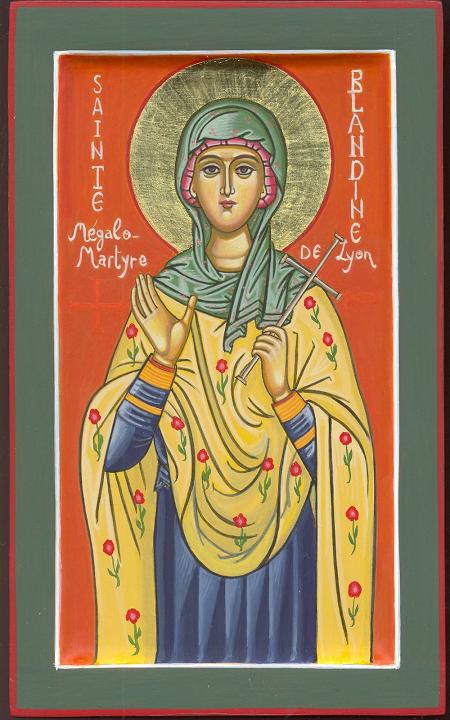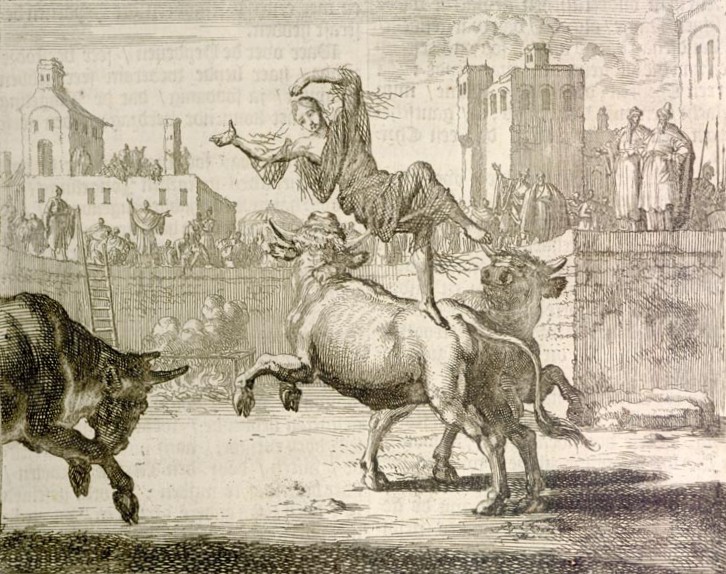“Blessed is a man who perseveres under trial; for once he has been approved, he will receive the crown of life which the Lord has promised to those who love Him.” (James 1:12)
There was a time in the history of the church when unbelievers had the power to rid themselves of Christians with little pretext other than the fact that they believed in Christ. Blandina lived during just such a time. The early church martyrs were purposefully tortured and killed in order to make a statement by the Roman government that worship of anyone else other than Caesar would not be tolerated.
 We have heard many stories about the Christians being thrown to wild beasts just to entertain the Roman populace. Often, Christians who were Roman citizens would have the easier execution of beheading. But the slaves who were Christians suffered horrible torture and gory death in the amphitheaters to amuse the Roman crowds.
We have heard many stories about the Christians being thrown to wild beasts just to entertain the Roman populace. Often, Christians who were Roman citizens would have the easier execution of beheading. But the slaves who were Christians suffered horrible torture and gory death in the amphitheaters to amuse the Roman crowds.
Blandina (martyred in 177 AD) was a slave woman who had been taken into custody with her master who was also a Christian. She was not in very good health and not expected to survive torture, but she seemed to get stronger and stronger the more the executioners beat and abused her. She would simply repeat, “I am a Christian,” over and over. This infuriated her torturers and they whipped her until they were tired out. Finally, they decided to take her to the amphitheater where other Christians were being beaten and burned. She was hung on a stake and put out for the wild beasts, but they would not touch her. And so,
“. . at length she was put in a net, and thrown to the wild bull; and when she had been sufficiently gored and wounded with the horns of the beast, and heeded nothing of all that chanced to her, for the great hope and consolation she had in Christ and heavenly things, was thus slain, insomuch that there was never woman put to death, that suffered so much as this woman did. Neither yet was their furious cruelty thus assuaged against the Christians.” The heathens invented crueler and more wicked things to do to the believers. The persecutors did not bury their bodies, but burned them and threw the ashes into the river thinking that they would be forgotten. “And this they did as if they had been able to have pulled God out of His seat, and to have hindered the regeneration of the saints, and taken from them the hope of the resurrection.” (John Foxe’s, The Acts and Monuments of the Church, page 42)
Others who watched her courageous death were blessed by her testimony and their own faith was bolstered. Even another woman, Biblias, who had renounced her faith, renewed her commitment to Christ and is listed among the roll of the martyrs.
Eusebius, writing several centuries later tells us of the results. Blandina, “by her continuous prayer gave great zeal to the combatants, while they looked on during the contest, and with their outward eyes saw in the form of their sister Him who was crucified for them, to persuade those who believe on Him that all who suffer for the glory of Christ have forever fellowship with the living God. And so she too was sacrificed, and the heathen themselves confessed that never before among them had a woman suffered so much and so long.” (Eusebius, Ecclesiastical History)
And so, Blandina’s acts of courage affected many more people than herself. Faith in God and His promises is our chief mainstay for the courage we have. Her concern was Christ and Christ only. God used her martyrdom, and those of many other saints, to encourage and build His church.
I pray that we will never have to suffer as Blandina did. But, do we even have enough courage to stand up for Christ against the political correctness of our day? We are still blessed with some freedom of speech in our country. Are we too frightened of what others may think of us to speak out boldly for Christ? I fear that if the church does not begin to take a stand against the wickedness and sin that is rampant in our country now, we will suffer at least imprisonment and maybe death for “breaking the law” of the unbelievers who will not tolerate any other god than their own god, the state.

